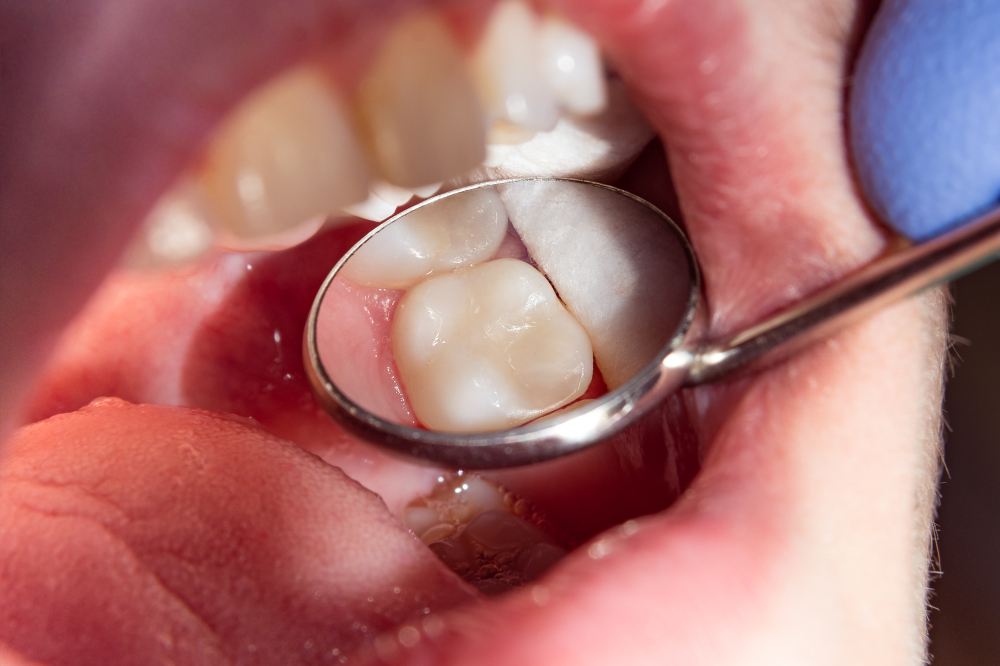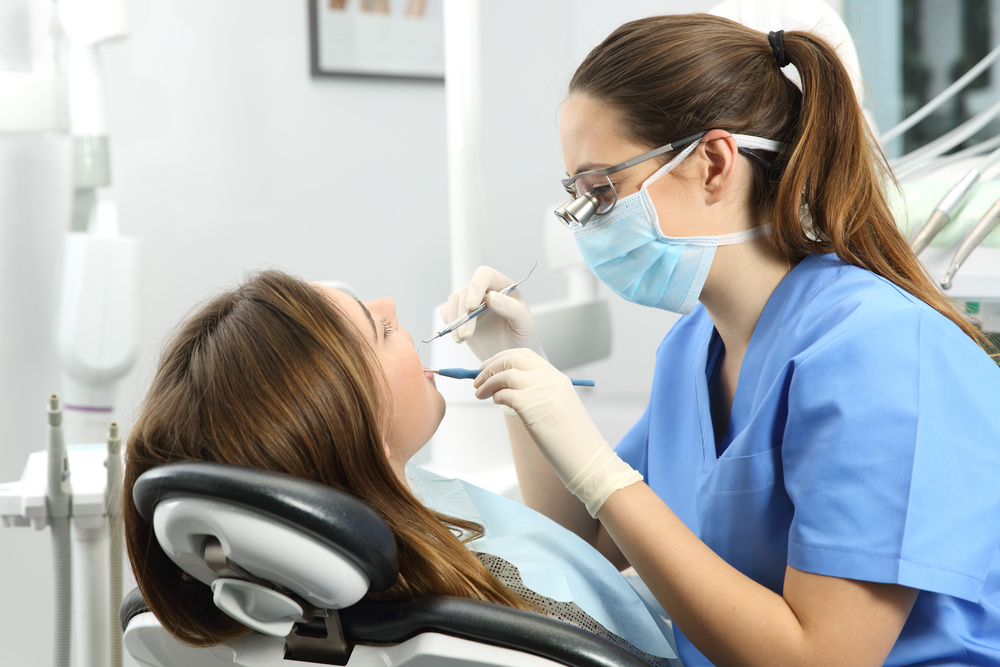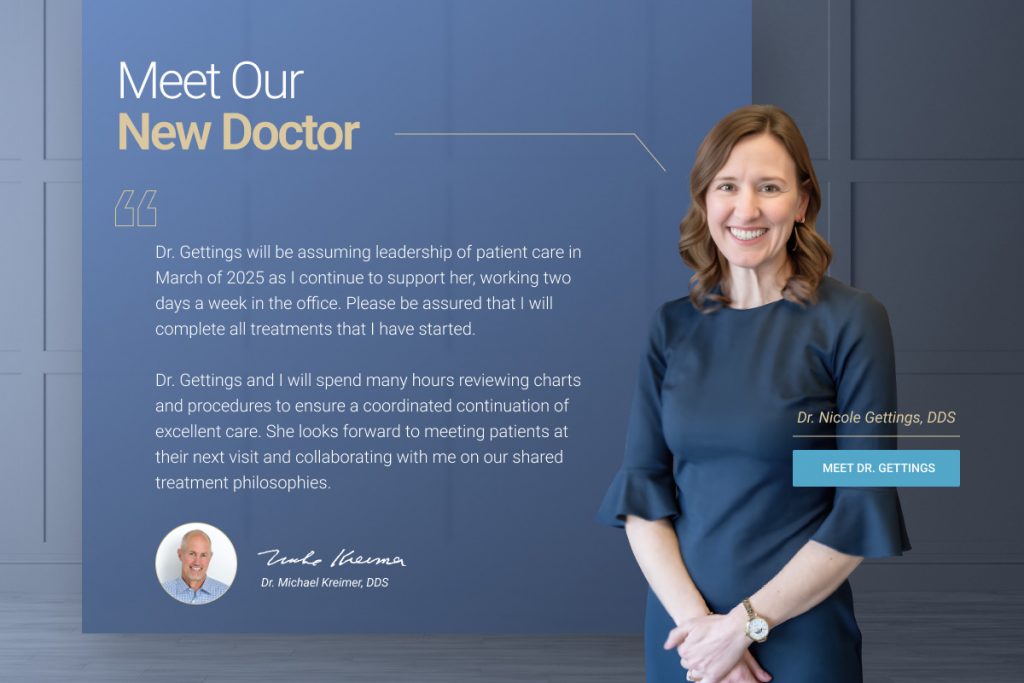A Closer Look at Glass Ionomer Dental Restorations at Michael Kreimer, DDS
Say goodbye to unsightly metal fillings – glass ionomer fillings offer a natural-looking, tooth-friendly alternative. If you’re looking for a fluoride-releasing filling that bonds seamlessly with your tooth, this could be the ideal solution.
To schedule your appointment at Michael Kreimer, DDS, and learn more about the types of dental fillings we offer, contact our dentist in Loveland, OH, today by calling (513) 677-3656. Our practice embraces patients from local areas, including Hamilton Township, Milford Township, and Mason.
Comprehensive Care & Convenience for Patients in the Cincinnati Area
We provide a full range of dental services with modern conveniences that make your experience as smooth as possible. Our patients appreciate our thorough approach and attention to detail. Don’t believe us? Hear it from our patients:
- “Great appt! Everyone is always friendly and welcoming! I like getting text message appt reminders!” — Dave J.
- “Always a great experience with staff and dentist. Very willing to work with you and provide a wide range of services.” — Anonymous
What Are Glass Ionomer Fillings?
Glass ionomer fillingsare a type of dental restorative material commonly used to repair decayed teeth, fill cavities, and even replace old fillings. They’re made from a combination of glass powder and an organic acid, such as polyacrylic acid, and are known for their ability to bond chemically to tooth structure.
Types of Glass Ionomer Fillings
There are various types of glass ionomer fillings, including:
- Conventional Glass Ionomer: Conventional glass ionomer fillings are self-cured and have been used for many years in dentistry. They’re suitable for various applications, including small to medium-sized cavities.
- Resin-Modified Glass Ionomer: Resin-modified glass ionomer fillings combine the benefits of traditional glass ionomers with resin-based materials, offering improved strength and aesthetics. They’re often preferred for restorations in visible areas.
- Compomer (Composite-Glass Ionomer Hybrid): Compomers are a hybrid of composite resin and glass ionomer materials. They provide better aesthetics than traditional glass ionomers and are used for small to medium-sized cavities.
Glass Ionomer Fillings Uses
Glass ionomer fillings may be recommended by your dentist:
- Small to Medium-Sized Cavities: Glass ionomer fillings are particularly suitable for repairing small to medium-sized cavities in both adult and pediatric patients.
- Root Surface Cavities: They can be used on root surfaces to treat cavities caused by gum recession or root exposure.
- Pediatric Dentistry: Glass ionomer fillings are commonly used in pediatric dentistry due to their fluoride-releasing properties and ease of application.
- Non-Stress-Bearing Areas: They’re ideal for non-stress-bearing areas of the mouth, such as the front teeth and some premolars.
Advantages and Disadvantages of Glass Ionomer Fillings
Advantages
- Natural appearance and translucency
- Fluoride release aids in cavity prevention
- Minimal tooth preparation is required
- Suitable for non-stress-bearing areas
- Biocompatible and well-tolerated by tissues
Disadvantages
- Limited durability compared to some alternatives
- Sensitive to moisture during placement
- Weaker than materials like amalgam
- Aesthetic limitations in highly visible areas
The Glass Ionomer Filling Procedure at Michael Kreimer, DDS
The glass ionomer filling procedure begins with a thorough dental examination and diagnosis, followed by tooth preparation and dental sedation to ensure comfort. The decayed portions of the tooth are removed, and the glass ionomer material is mixed and applied to fill the cavity, with optional light curing to enhance durability.
After shaping and polishing the filling for a natural appearance, patients are advised on oral hygiene and dietary precautions. Regular follow-up appointments may be scheduled to maintain the filling’s integrity. Glass ionomer fillings are favored for their fluoride-releasing properties and suitability for certain dental applications.
Costs
Patients can expect to spend between $75 to $200on a single glass ionomer filling. They’re typically less expensive than composite fillings but more expensive than amalgam fillings. Factors that will influence the total cost include the size and location of the cavity, as well as your dental insurance coverage.
Frequently Asked Questions
How long do glass ionomer fillings last?
Glass ionomer fillings typically last 5 to 10 years, though their lifespan varies based on the filling’s location, the patient’s oral hygiene, and the specific material used. They are less durable than amalgam or ceramic fillings but can be effective in low-stress areas like primary teeth or near the gumline. Regular dental checkups help monitor their condition and ensure timely replacement if needed.
Are glass ionomer fillings safe?
Yes, glass ionomer fillings are safe and biocompatible, meaning they are well-tolerated by the body with minimal risk of adverse reactions. They release fluoride over time, which helps prevent further tooth decay around the filling. They are widely used in pediatric dentistry and for patients with high cavity risk, though those with specific allergies should consult their dentist.
What are glass ionomer fillings made of?
Glass ionomer fillings are made from a mixture of silicate glass powder and an organic acid, forming a tooth-colored, adhesive material. Some formulations include resin for added strength. Their fluoride-releasing property makes them unique, promoting tooth protection, especially in decay-prone areas.
Where are glass ionomer fillings typically used?
Glass ionomer fillings are often used for small cavities, primary (baby) teeth, or non-load-bearing areas like the sides of teeth or near the gumline. They are also used as temporary restorations or in areas with high decay risk due to their fluoride release. They are less suitable for high-pressure areas, like molars, where stronger materials like amalgam or ceramic are preferred.
Are glass ionomer fillings as strong as other fillings?
Glass ionomer fillings are less durable than amalgam or ceramic fillings and are more prone to wear or cracking under heavy chewing forces. They are best suited for low-stress areas or temporary restorations. For high-pressure areas, your dentist may recommend alternative materials for better longevity.
Contact Dr. Kreimer Today to Learn About Your Options
Ready to say goodbye to tooth decay? Contact Michael Kreimer, DDS, today to learn more about your dental filling options. To schedule a consultation, call Dr. Kreimer, a top-rated dentist in Loveland, at (513) 677-3656. Our dental practice welcomes patients from Murdock, Landen, Mason, Reading, and beyond.






